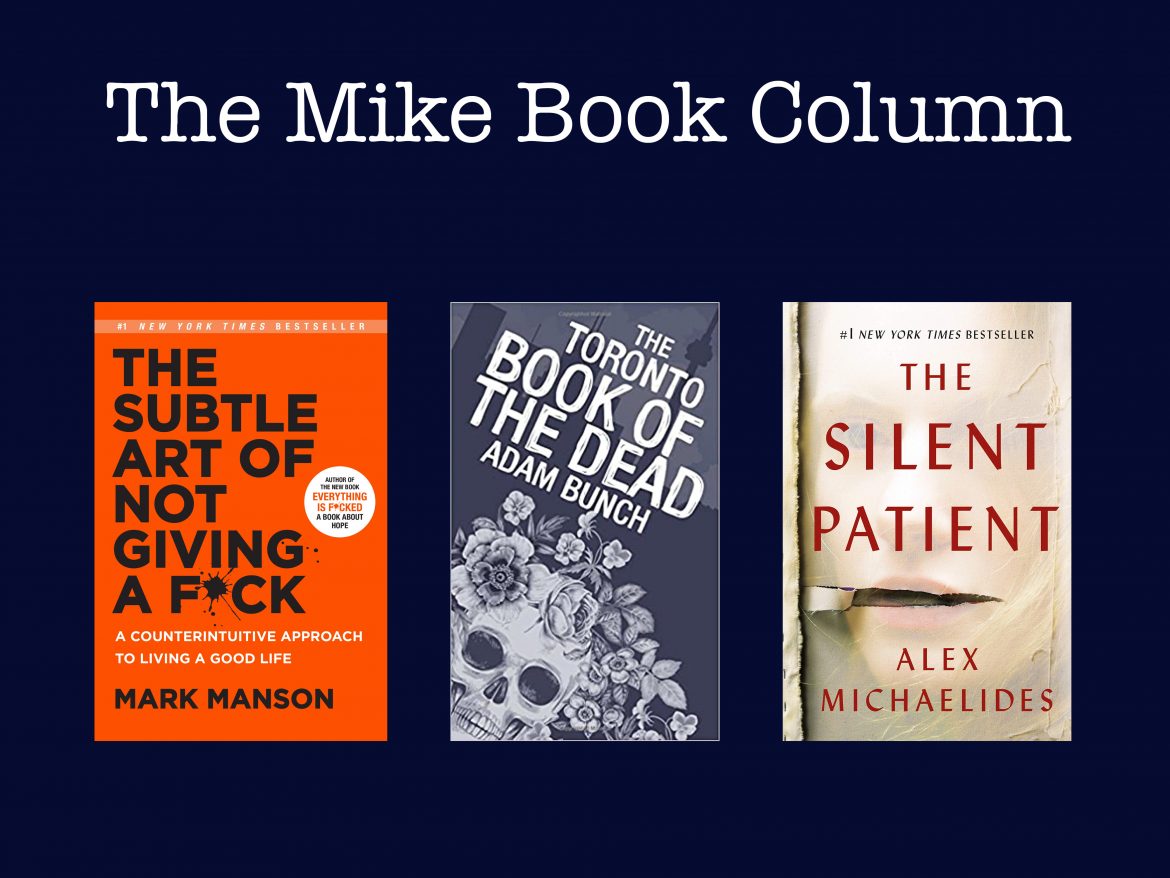Photo Credit: Samantha Hamilton, Photos Editor
Book Review: The Subtle Art of Not Giving a F*** by Mark Manson
Positivity is Overrated AF
Arib Hassam, The Mike Staff Writer
Sometimes life sucks. For a lot of us, this is a hard pill to swallow. We’re constantly bombarded with images of people living a seemingly perfect lifestyle on social media, leading us to have a certain perception of how we are supposed to think, feel and act. As Mark Manson explains in his book, The Subtle Art of Not Giving a F*ck, this is incredibly problematic and is in fact the root of many of our personal issues in the digital age. What’s the solution? According to Mark Manson, it all comes down to “reorienting our expectations for life and choosing what is important and what is not.” This is the key principle of The Subtle Art of Not Giving a F*ck. This book provides a “counterintuitive” blueprint to enacting this idea in various aspects of life. Manson’s narration throughout the book is refreshingly comedic, and the personal anecdotes included feel authentic and relatable.
Additionally, I feel that the book contains very little “fluff” or filler material. That is, each page contains simple, condensed and practical information on how to reject the unrealistic expectations that we hold ourselves to, and adopt a healthier, more rational mindset. Although the chapters can sometimes feel a bit lengthy, by the end of each one you will have a clear idea of what the lesson was and how to apply it to your own life. Overall, the book contains some solid wisdom for navigating our often messy and complicated lives that I think any reader could benefit from.
Book Review: The Silent Patient by Alex Michaelides
I can’t stay silent about this book, so here’s a spoiler-free review
Alessia Baptista, Managing Editor
Content warning: murder, trauma and psychological issues are prevalent themes of this text. Read at your own discretion.
The Silent Patient is a gripping psychological thriller about a woman who murders her husband, and the patient-obsessed therapist who becomes attached to her.
The plot follows Theo Faber; a criminal psychologist who devotes his career to working with his newest patient: Alicia Berenson. Alicia has been convicted of murdering her husband Gabriel and remains- you guessed it- silent in the psychiatric hospital she is sent to after the incident.
If there’s one thing I love in a novel, it’s an effective use of alternating points of view. Luckily, the narration style of The Silent Patient shifts between Alicia’s personal diary and Theo’s retelling of events in the present day, which allows for a smooth unraveling of the plot and all its thrilling details.
I am particularly obsessed with Alicia’s character; there is power in her silence. The diary entries enable us to enter Alicia’s mind and attempt to understand her side of the story because, evidently, she has no dialogue. Personally, I sympathize with her immediately because she has gone through so much trauma and the writing style describes her healing process in a dark yet delicate way.
Theo’s character is also well developed. One moment, you trust him, and the next, you’re left questioning if he has an ulterior motive. It’s the constant questioning of his trust and the twists and turns of the plot that really pulls the reader back-and-forth; the author has you racking your brain until the very end. Speaking of the end, I’m sure the final scene will leave you silent as well. (See what I did there?)
Overall, marriage thrillers are one of my top genres to read, so this one certainly qualifies as one of the more addictive choices. Whether you choose to read this book in its physical form, or you listen via audiobook (which is an incredible performance,) you will not be disappointed with The Silent Patient.
Book Review: The Toronto Book of the Dead by Adam Bunch
Revitalizing the history of Toronto, one account at a time
By: Julliana Santos, Arts Editor
Adam Bunch’s The Toronto Book of the Dead, published in 2017, is an anthology of historical moments, told with a narrative that allows for nuanced perspectives. Each chapter spans a specific snapshot into history, often focusing on the human experience, always tying it into the physical geography of the city itself. Each story deals with death and pulls into focus the question of what dies, what is remembered, and what lives on. From the Huron-Wendat burial mound that makes up Tabor Hill near the Highway 401, to the ghost of Toronto’s first lighthouse keeper on Gibraltar Point, to Ruth Lowe’s 1939 composition “I’ll Never Smile Again,” performed by Frank Sinatra on the verge of the second world war, Adam Bunch weaves the profound certainty of death into a reflection on how death and the process by which we remember history shapes our present perspectives. He tackles each chapter with sound research and a human awareness that grounds the reader in the practice of remembering. Tactile objects, such as museum pieces, towering buildings, geographical locations, songs, novels, and oral legends, engage the reader in an ongoing process of remembrance – which breathes out of the book and into the reader’s everyday experience.


